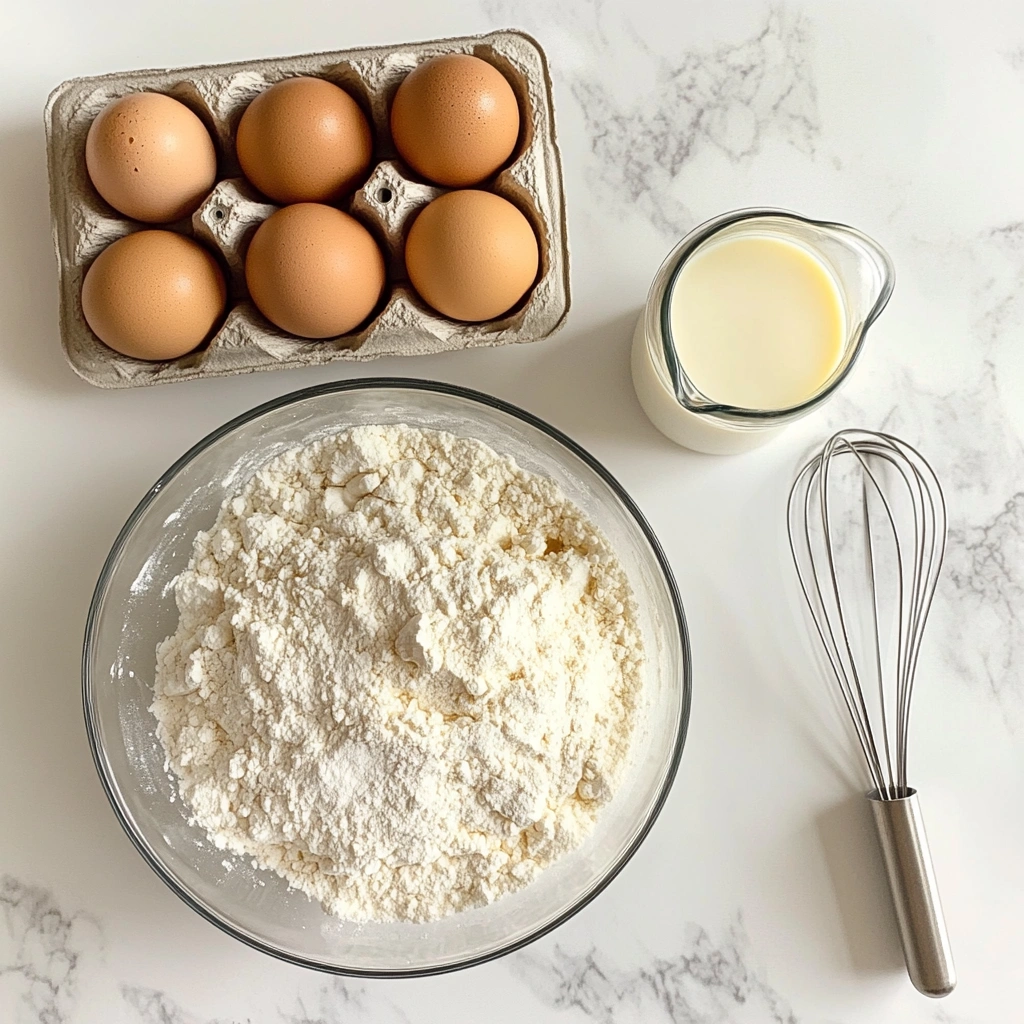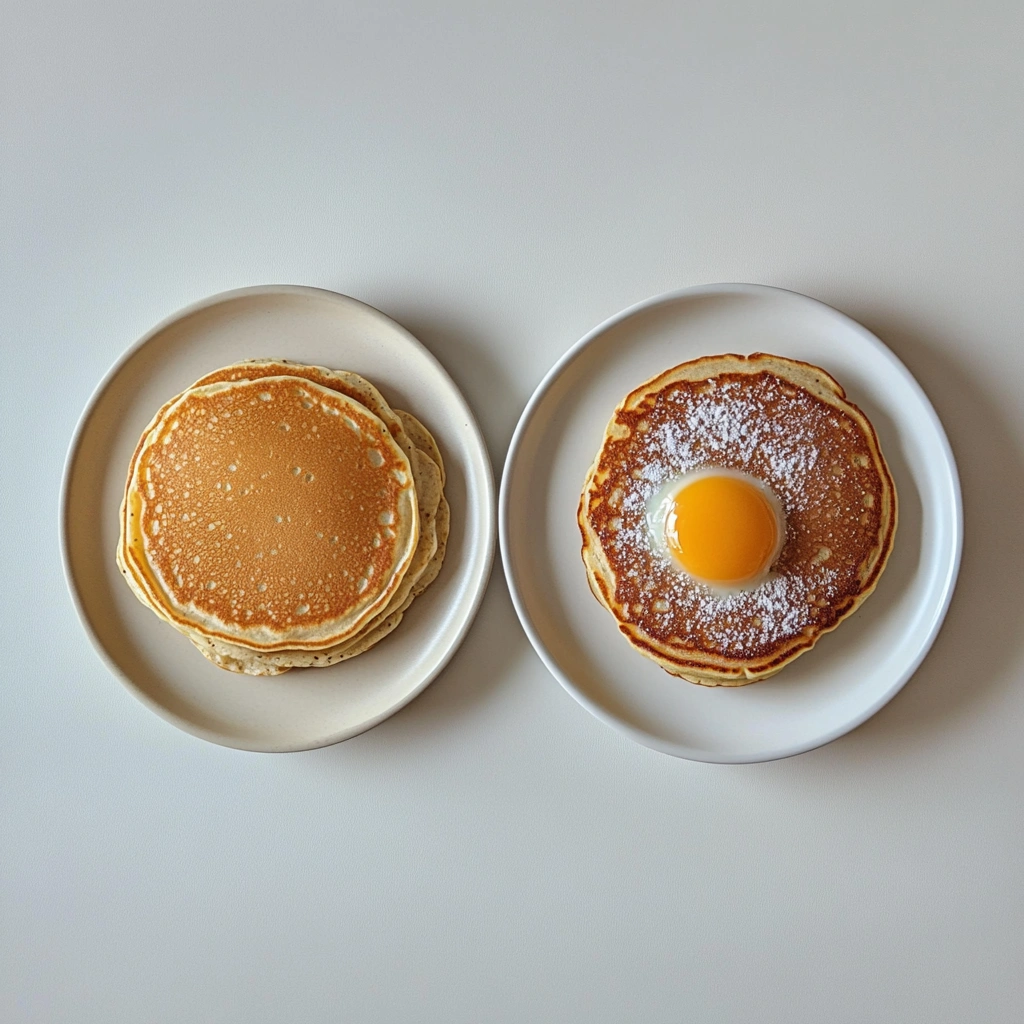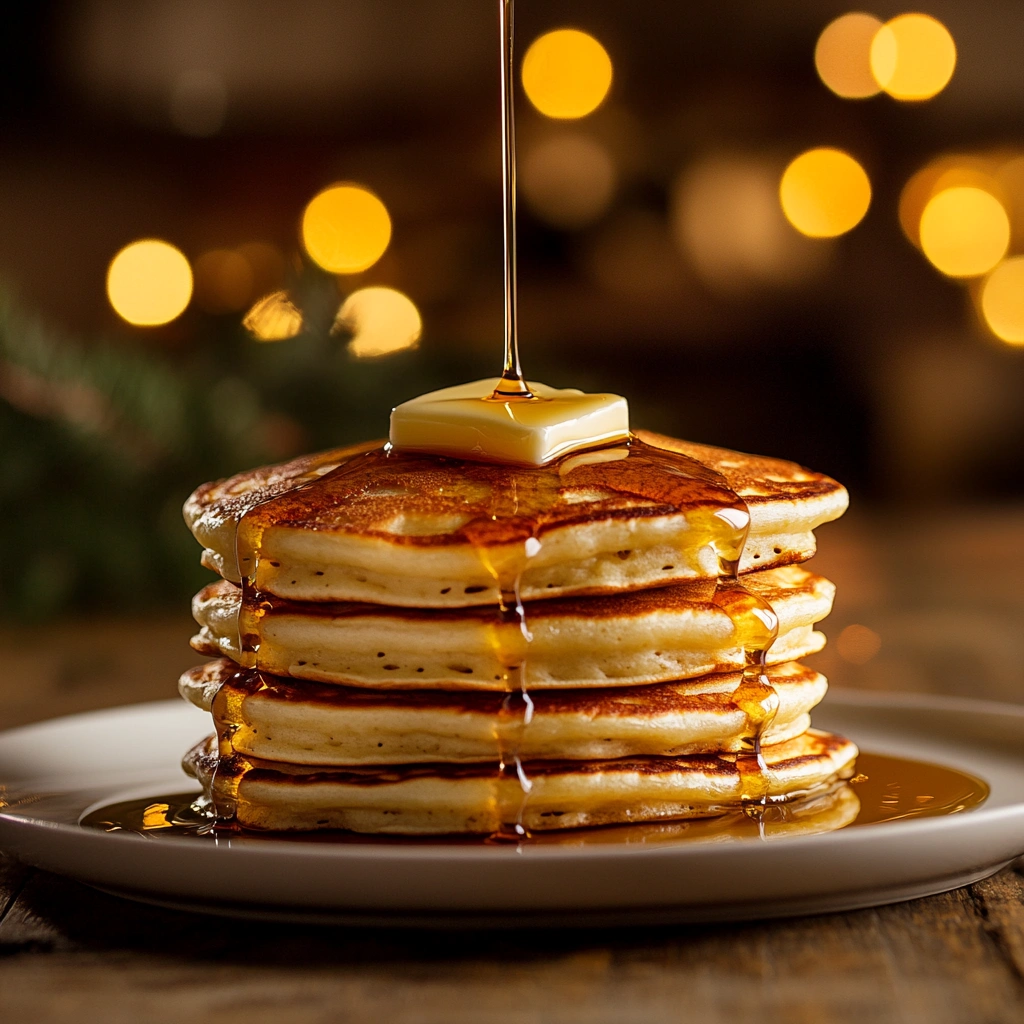Introduction
Pancakes are a classic breakfast staple enjoyed across cultures and continents. Whether you prefer fluffy, golden stacks or thin, delicate crepes, the ingredients you use can make all the difference. One ingredient that often sparks curiosity is the humble egg. Many pre-made pancake mixes come ready with most of the essentials, but should you go the extra mile and crack in an egg or two?
This article dives deep into the science and art of adding eggs to pancake mix. We’ll uncover the function of eggs, their benefits, and potential drawbacks. You’ll also discover how to adapt recipes with egg substitutes, balance liquid ratios, and create variations that fit your dietary preferences. Ready to whip up some knowledge? Let’s get started!
Part 1: Understanding Pancake Mix Ingredients
Common Components of Pancake Mixes
Pancake mix is a blend of essential dry ingredients designed to simplify the pancake-making process. The base usually includes flour, a leavening agent like baking powder, a sweetener, and sometimes milk powder or flavoring. These components work together to create the soft and fluffy texture pancakes are famous for.
- Flour: Acts as the foundation, providing structure.
- Leavening Agents: Baking powder or baking soda helps the batter rise by creating air pockets.
- Sugar: Adds sweetness, enhancing flavor and aiding browning during cooking.
- Milk Powder: Contributes creaminess to the batter.
These ingredients create a well-rounded mix that delivers dependable results, but they’re often designed to be neutral. That’s where the addition of fresh ingredients like eggs comes in, bringing depth and character to your pancakes.

The Role of Each Ingredient
Every ingredient in pancake mix plays a specific part, but when you introduce additional components—like eggs—the dynamics change.
- Eggs contribute richness, moisture, and a subtle golden hue.
- Milk or water balances consistency, ensuring the batter isn’t too thick or runny.
- Oil or melted butter boosts tenderness, while preventing the pancakes from sticking.
When all these elements come together, they produce a batter that cooks evenly and yields soft, flavorful pancakes. However, adding extras like eggs requires careful adjustment of ratios to maintain balance.
By understanding the composition of pancake mixes and how each ingredient interacts, you can make more informed decisions about tweaking recipes to suit your needs. Whether you’re looking for a fluffier texture or a richer flavor, the key lies in understanding the basics.
Part 2: The Function of Eggs in Pancake Batter
Binding Properties
Eggs are often considered the glue that holds pancake batter together, quite literally. Their binding properties ensure that the batter’s components stick together, resulting in a cohesive and stable structure during cooking. Without a binding agent like eggs, the batter might fall apart or crumble when it hits the griddle.
What makes eggs such effective binders? Their protein content is the star player here. When heated, egg proteins denature and then coagulate, forming a network that traps the starches and other ingredients in the batter. This process ensures that your pancakes maintain their shape while cooking, delivering that satisfying flip with minimal mess.
Moreover, eggs prevent the batter from being too fragile or prone to breaking, which is especially helpful if you’re adding extras like blueberries, chocolate chips, or banana slices.
Moisture and Texture Enhancement
Ever wondered why pancakes made with eggs feel moist and tender compared to those made without them? Eggs contribute a significant amount of moisture to the batter, transforming it from a dry mix into a velvety, pourable consistency. This moisture isn’t just about hydration—it directly impacts the texture of the pancakes.
When eggs are whisked into the batter, they blend seamlessly with the liquid ingredients, distributing moisture evenly. As the pancakes cook, the water content from the eggs evaporates slowly, preventing them from drying out too quickly. The result? Pancakes that are soft and fluffy on the inside with a slight crispness on the outside.
Texture is further enhanced by the fat content in eggs, particularly in the yolks. This fat acts as a natural tenderizer, creating a luxurious mouthfeel. Pancakes cooked with eggs often have a light and airy texture that melts in your mouth—a quality that’s hard to replicate with egg-free mixes.
Why Eggs Affect Pancake Structure and Flavor
Eggs don’t just alter the structure of pancakes; they also impact the flavor profile. While their contribution might seem subtle, it’s undeniably present. Eggs add a richness that balances out the sweet and savory elements of the batter.
- Flavor: Egg yolks have natural fats and emulsifiers, which create a smooth, creamy flavor that enhances the pancake’s taste.
- Aroma: Cooking with eggs also adds a mild, inviting aroma to your pancakes, elevating the sensory experience.
In terms of structure, eggs work in tandem with the leavening agents in the mix. When the batter is heated, the air bubbles created by the baking powder or baking soda are trapped by the egg proteins, allowing the pancakes to rise. This cooperation between eggs and leavening agents gives pancakes their characteristic fluffiness.
The Science Behind Eggs and Browning
If you’ve ever admired the golden-brown finish on a pancake, eggs deserve some of the credit. They contribute to the Maillard reaction, a chemical process between amino acids and reducing sugars that occurs during cooking. This reaction not only gives pancakes their appealing color but also enhances their flavor.
Eggs contain both proteins and sugars, which participate in this browning process. Without them, your pancakes might look pale and less appetizing. Adding eggs ensures that each pancake develops a beautiful crust, perfect for soaking up syrup or butter.
When Not to Use Eggs
While eggs bring numerous benefits, they’re not always necessary. Some pancake mixes are already designed to work without additional ingredients, and adding eggs may disrupt the balance.
For example:
- If the mix includes powdered eggs, adding fresh eggs might make the batter overly dense or rich.
- Some dietary preferences or restrictions, such as veganism or egg allergies, require alternatives.
Understanding the role of eggs allows you to make better choices. If eggs don’t suit your recipe or preferences, substitutes can replicate many of their effects without compromising the final product.
Egg-Free Pancake Options
For those avoiding eggs, there are excellent alternatives that mimic their binding and moisture-retaining properties:
- Mashed bananas: Add sweetness and a similar moisture level to eggs.
- Applesauce: Works as a binder while contributing a subtle fruit flavor.
- Ground flaxseeds or chia seeds: When mixed with water, they form a gel-like consistency, perfect for binding pancake batter.
By choosing an egg substitute, you can tailor your pancakes to meet specific dietary needs without sacrificing quality.

Part 3: Benefits of Adding Eggs to Pancake Mix
Improved Texture and Fluffiness
One of the most noticeable benefits of adding eggs to pancake mix is the improved texture they bring to the table. Eggs contribute a unique combination of structure and softness, giving pancakes that much-loved fluffy yet tender bite. The proteins in eggs work to create a sturdy yet airy framework, trapping the air bubbles formed by the leavening agents.
Without eggs, pancakes can sometimes feel dense or overly chewy. Adding just one or two eggs makes a world of difference by ensuring that the batter rises evenly during cooking. The result is a stack of pancakes with an irresistibly light and fluffy texture—perfect for stacking and syrup-drizzling.
Enhanced Flavor Profile
Eggs also elevate the flavor of pancakes in subtle but impactful ways. The natural richness of the yolk adds a creamy, savory undertone that balances out the sweetness of the batter. Additionally, the fats in eggs create a smooth texture on the palate, complementing the flavor of toppings like maple syrup, fresh fruit, or whipped cream.
By incorporating eggs into your pancake mix, you also improve their ability to brown during cooking. The golden hue and slight crispness on the edges come from the interaction between the egg proteins and sugars in the mix—a process known as the Maillard reaction. This creates pancakes that look as delicious as they taste.
Nutritional Advantages
Adding eggs to your pancake mix doesn’t just enhance flavor and texture; it also boosts the nutritional value of your breakfast. Eggs are a powerhouse of essential nutrients, including:
- Protein: Builds and repairs tissues, helping you feel fuller for longer.
- Vitamins: Eggs are rich in B vitamins, which support energy production.
- Minerals: They provide selenium, phosphorus, and other vital nutrients for overall health.
For families with kids, adding eggs to pancakes is an easy way to sneak in extra nutrition without altering the taste significantly.
Part 4: Potential Drawbacks of Adding Eggs
Dietary Restrictions and Allergies
While eggs bring undeniable benefits to pancakes, they aren’t suitable for everyone. Dietary restrictions and allergies are among the primary reasons some people avoid adding eggs to pancake mix. Egg allergies, especially common in children, can cause reactions ranging from mild skin irritations to severe anaphylaxis. For individuals with such sensitivities, consuming eggs—even in pancake batter—can be dangerous.
Moreover, certain dietary preferences or restrictions, like veganism, explicitly exclude eggs. For those avoiding animal products, eggs are off-limits, making it necessary to find suitable alternatives to maintain pancake quality. Even for non-vegans, health concerns such as high cholesterol might lead to the avoidance of eggs. The yolk, while nutrient-rich, contains a significant amount of cholesterol, which may not align with heart-healthy diets.
Alteration of Original Mix Ratios
Adding eggs to pancake mix can disrupt the carefully calibrated balance of ingredients in pre-packaged mixes. Many store-bought mixes are designed to be foolproof, providing a consistent texture and flavor without the need for additional ingredients. When you introduce eggs, you may need to adjust other components, such as liquid content, to maintain the desired batter consistency.
For example:
- If you add an egg without reducing the milk or water, the batter may become too runny, leading to thin and unevenly cooked pancakes.
- Adding eggs to a mix that already includes powdered egg can result in overly dense pancakes, as the batter might become saturated with proteins and fats.
Balancing the ratios is key, but it requires an understanding of how each ingredient interacts. For beginners or those in a hurry, adjusting the mix might feel more like a hassle than a benefit.
Overpowering the Original Flavor
Eggs have a distinctive taste that may not always complement the flavors in some pancake mixes, especially flavored ones like chocolate or pumpkin spice. While the change might be subtle, it can alter the final flavor profile, making the pancakes taste richer or more “eggy” than desired.
This becomes particularly noticeable if too many eggs are used. For instance, doubling the number of eggs in a recipe can overwhelm the delicate balance of sweetness and other flavors in the mix, leaving pancakes with a savory overtone that might not suit all palates.
Environmental and Ethical Concerns
Beyond taste and texture, some individuals choose to avoid eggs for environmental or ethical reasons. Egg production has been linked to concerns about animal welfare and environmental sustainability. For consumers mindful of their ecological footprint, opting for egg-free pancake recipes or substitutes like aquafaba (chickpea water) may align better with their values.
Frequently Asked Questions
Can I add eggs to any pancake mix?
Yes, you can generally add eggs to most pancake mixes, but it depends on the type of mix. Some mixes are already designed to include powdered eggs or other binding agents, so adding fresh eggs might require adjustments to the liquid ratios. Always check the package instructions and experiment to find the right balance.
What happens if I don’t add eggs to pancake mix?
If you skip eggs, your pancakes may lack the fluffy texture and moist crumb that eggs provide. They might turn out denser and less cohesive, as eggs act as a binder and a source of leavening. However, using substitutes like mashed bananas or yogurt can help replicate the binding and moisture effects.
Are there vegan alternatives to adding eggs in pancake batter?
Absolutely! Popular vegan egg replacements include:
- Ground flaxseeds or chia seeds mixed with water (1 tablespoon seeds + 3 tablespoons water).
- Applesauce or mashed bananas for moisture and binding.
- Commercial egg replacers like Bob’s Red Mill Egg Substitute or Ener-G.
How do eggs affect the texture of pancakes?
Eggs enhance the texture by contributing moisture, tenderness, and fluffiness. The proteins in eggs create structure, while the fats in the yolk tenderize the pancakes, resulting in a light and airy consistency.
Can I use egg substitutes in pancake mix?
Yes, you can use a variety of egg substitutes, depending on your dietary needs and taste preferences. Options like aquafaba, silken tofu, or even plain yogurt work well for binding and adding moisture to the batter. Adjust liquid quantities as needed for the desired consistency.
What is the nutritional impact of adding eggs to pancakes?
Adding eggs boosts the nutritional content of your pancakes by providing high-quality protein, vitamins (like B12 and riboflavin), and minerals such as selenium and phosphorus. They also increase caloric and fat content, so portion size matters if you’re watching your intake.
Does adding eggs make pancakes fluffier?
Yes, adding eggs helps pancakes become fluffier. The proteins and fats in eggs support the leavening process, trapping air bubbles and allowing the batter to rise evenly as it cooks. This results in soft, fluffy pancakes with a tender crumb.
Conclusion
Adding eggs to pancake mix can significantly enhance the flavor, texture, and nutritional value of your pancakes, transforming an everyday breakfast into a gourmet delight. Eggs act as a binder, provide moisture, and contribute to the fluffiness that many pancake lovers crave. However, it’s essential to consider personal preferences, dietary restrictions, or ethical concerns when deciding whether to include them.
For those who can’t or choose not to use eggs, there are plenty of effective substitutes that mimic their benefits without compromising on quality. By understanding the role of eggs in pancake batter, you can customize your recipe to suit your needs, whether that means creating classic fluffy pancakes, experimenting with variations, or meeting dietary requirements.
In the end, whether you add eggs, skip them, or use substitutes, pancakes remain a canvas for culinary creativity. With the right knowledge and a little experimentation, you’re sure to create a stack that’s delicious, satisfying, and tailored just for you.

